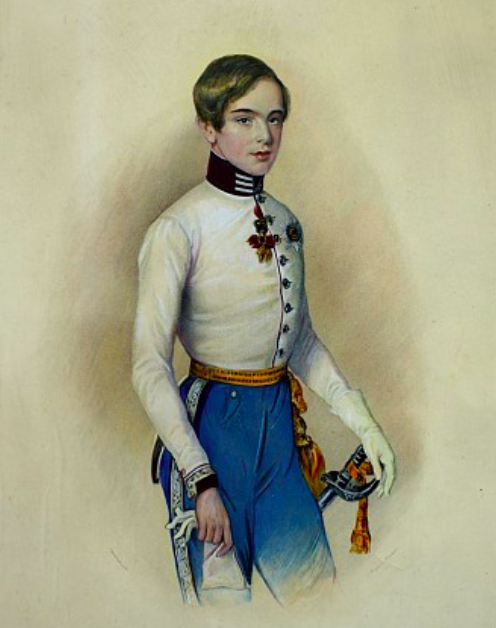18.8. 1830 Francis Joseph I. is born.
Categories: Personalities , Calendar
 František Josef had a military education, learned foreign languages and was brought up in the spirit of the Austrian Grand Seigneur. He was born at Laxenburg Castle near Vienna.
František Josef had a military education, learned foreign languages and was brought up in the spirit of the Austrian Grand Seigneur. He was born at Laxenburg Castle near Vienna.
His father was Archduke Franz Karl, younger son of Emperor Franz, his mother was Sophie of the Wittelsbach family. "Historians state that from her marriage in November 1824 until the birth of her first son, FranzJoseph, in August 1830, she miscarried twice, inJuly 1826 and June 1827.According to Gerd Holler, she was pregnant five times," Jan Bauer writes in his book Women of the House of Habsburg.
Sophie was a woman of strong will and great ambition, consciously raising her son as the crown prince of a monarchy that stood above Napoleon as the first in Europe. Her successor, Archduke Ferdinand, whom the Emperor Francis was to succeed to the throne of Austria, was feeble-minded from the age of ten, and though he married Marie Anne of Savoy (or was married), he remained childless.
Franz Joseph's mother transmitted to her son two essential traits of her character, a dynastic consciousness of the sovereign's dignity, coupled withresistance to the Revolution, and a fund of thought, drawn from German Romanticism, which always remained inherent in Franz Joseph's relationship to the German world.
"At various times in the career of life which led Franz Joseph I in German affairs from Olomouc (1850), where the union of the North and Central German States with Prussia was buried. Then to the battlefield of Hradec Kralove in 1866, where Austria was forced to withdraw from the German alliance and to recognize that German unification would become a fait accompli without Austria. And then again to the alliance with the German Reich in 1879, when Austria-Hungary became internationally only a member of the new Central European entity, yet something of Kaiser Franz Joseph always remainedof the mystical heritage of his ancestors, who for centuries had shaped the destinies of the peoples of central European territory.defying all crises and adversity," write the authors of Franz Joseph I. - One hundred years since his death.
Throughout his life, Franz Joseph felt like a German prince and was also drawn to the German spirit. Although German Romanticism was at its cradle and Catholicism was a traditional part of the Habsburg soul, according to the authors of the book, we must not imagine Franz Joseph's relationship to the Church as anything other than an Austrianaristocrat to religion, where the good attitude of the individual to the teachings of the Catholic Church and the emphasis on the outward signs of Catholicism were part of good manners.
He had a military education, had learned foreign languages, and had been brought up in the spirit of the Austrian grandseigneur. Through the influence of his family and upbringing, he stuck, according to many, to his spiritual foundation in the eighteenth century. All his life he was dominated by the idea that he had been chosen to rule the nations, and that in the discharge of his duty he was not bound by any other order than that of his conscience, which governed his actions by his relationship to God. "Francis Joseph considered himself the supreme protector of the rights of the race, given by the divine will to him and his predecessors," says another publication on this great monarch.
He was Emperor of Austria and King of Bohemia, Hungary, Lombardy, Venice, Dalmatia, Slavonia, Croatia, etc. for 68 years. He died in the middle of the First World War in 1916 of pneumonia.
Sources.
The article is included in categories: